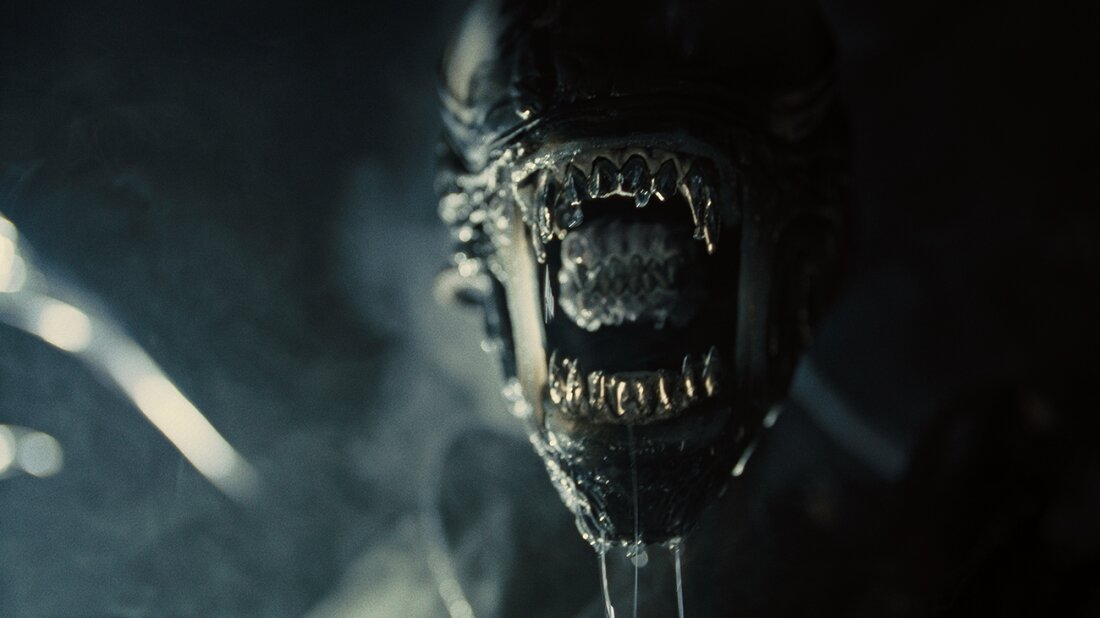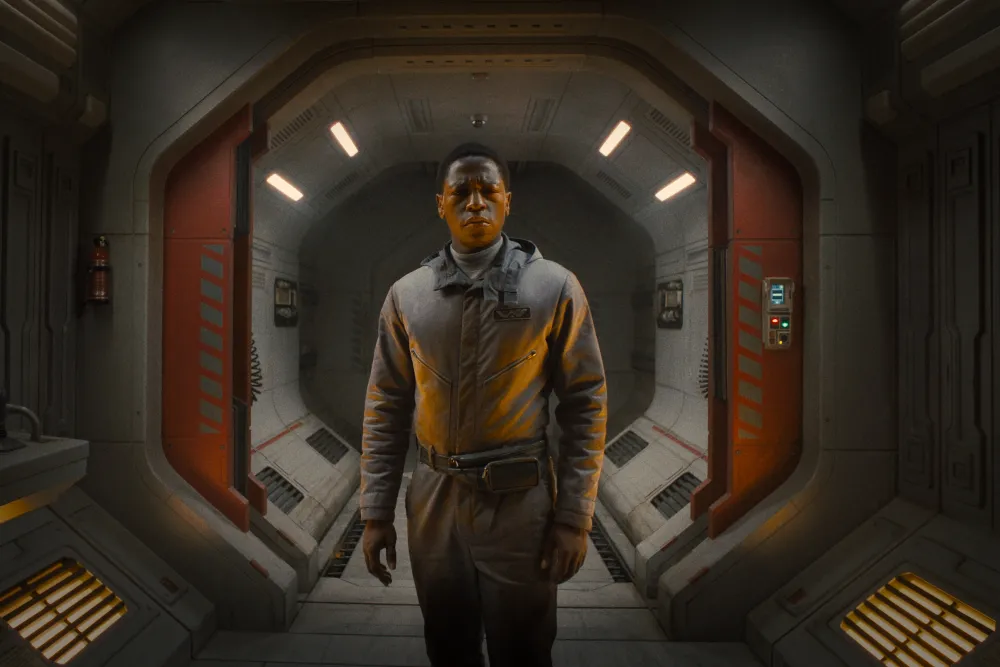‘Alien: Romulus’ Brings Back the Dead in Ethically Terrifying Ways

Hollywood has long been obsessed with the dead. At first, at least within the cinematic history I’m most familiar with, their dead have been of the Norma Bates variety. Quite literally, in fact, in the case of Gus Van Sant’s 1998, shot-for-shot remake of Alfred Hitchcock’s classic Psycho. Remakes, especially horror remakes, predate the 1990s, of course. There was Philip Kaufman’s superior 1979 Invasion of the Body Snatchers, a remake whose pod people better supplanted Finney’s themes to screen than Don Siegel’s respectable 1956 original. The dead re-enrolled in camp in Friday the 13th, disrupted our dreams in A Nightmare on Elm Street, and revved up their weapons once more in The Texas Chainsaw Massacre. Instead, the dead I’m speaking of here are of the ghoulish Hollywood Ouija variety wherein they, quite literally, hope to resurrect what’s gone. This past weekend, they did so aboard Alien: Romulus’ floating Weyland-Yutani vessel.
When horror fans first bemoaned the inundation of horror remakes in the early aughts, they did so because of the presumption that filmmaking was a zero-sum game. For every horror remake greenlit, there was another, strikingly original project left to die. This wasn’t exactly true. Yes, horror remakes enjoyed top billing at most national theater chains, but the horror scene continued to flourish, branching out into independent and international spaces that would later define the era.
Alien: Romulus is an entirely different beast. Refreshingly, up until recently, the Alien franchise has resisted the kind of cheap fan service most of today’s resurrected horror IPs are constrained by. Alien: Covenant, the entry that preceded Romulus, was met with mixed reactions precisely because the movie regularly went off in singularly weird directions, queer-coded flute innuendo and all. Romulus was billed as an ostensible return to form for the franchise, a dubious claim considering the prior two entries were helmed by Scott himself. Nonetheless, Fede Álvarez is a known property, and he possesses the kind of no-holds-barred genre prowess that could, in theory, send the franchise into an exciting new orbit.
Unfortunately, for all the gruesome thrills—and trust me, Romulus has plenty—the film is worse than the early century’s remakes. Instead, the movie amounts to a slideshow of the series’ greatest hits, akin to something like a college elective titled Alien: 101. That makes for an intermittently bad movie. Supplanting the deceased Ian Holm into the role of franchise lore surrogate goes beyond lazy. I’d go so far as to say it’s inexcusable. But how did the franchise get there? More importantly, how have the trends of filmmaking in general shifted to the point where we’ve arrived at box office champions prominently and casually featuring replicas of late actors? In space, no one can hear you scream, but my distaste with Holm’s resurrected likeness can, I hope, be heard lightyears away.
Horizontal Integration

First, and perhaps fundamentally, it’s worth remembering that filmmaking is a business first, and an artistic pursuit second. Yes, there are filmmakers and cabals of artists whose moving images vehemently reject profit, but the broader canon of filmmaking as we know it, movies with production cycles and distribution, whether theatrically or digitally, exist more than anything to make money. Within the franchise, Alien: Resurrection exists because, according to Sigourney Weaver, they basically drove a “dump truck full of money” to her house. Reportedly, that figure was around $11 million (in 1997).
That paradox is fine and good; well known, though easy to forget when feelings are heightened. I bemoan the final reel of The First Omen, otherwise considering it one of the best religious horror movies of the century. Upon my first viewing, I incredulously asked why it so lazily needed to remind everyone which movie it was a prequel to. For money, of course. Even if for just an extra buck, it was spliced in to maybe make just that little bit more in box office receipts. Filmgoers aren’t just filmgoers—they’re consumers. They’re embroiled in a long history of ownership, Hollywood’s concerted efforts to retain valuable IPs, and the monopolization of the studios themselves—the ones responsible for producing the films we love in the first place.
The House of Mouse (Not the Screamboat Kind)
Presently, and in the case of Alien: Romulus specifically, Walt Disney Studios, a division of Disney Entertainment, itself a division of The Walt Disney Company, is at the core. I have an anti-Disney screed within me, though this won’t just be that. I’ve been to the parks and enjoyed them, and like every kid ever, I saw plenty of their classic animated movies on those enduring bits of nostalgia-bait VHS. I even accepted a free invitation to an early screening of Indiana Jones and the Dial of Destiny last year (and thought it was fine). As a prelude to Romulus, Indiana Jones featured uncanny digital de-aging for the entirety of its first act.
20th Century Studios (formerly 20th Century Fox) was purchased by Walt Disney Studios in 2020. Matters of monopolization, antitrust violations, and even horizontal integration (when one firm merges with another in the same industry) matter for naught, because it happened. It happened seven years prior, too, when Walt Disney Studios acquired Lucasfilm for a meager (ha) $4.05 billion. It’s a meme, sure, but a lot of the media released today is tethered in part to the House of Mouse, and that has rarely, if ever, been a good thing.
The biggest concerns aren’t even matters of quality. Has Disney mishandled the Marvel Cinematic Universe or the ever-expanding world of Star Wars? I wouldn’t know, because I’m not the target audience, but the general sense seems to be, yes, they have. But who cares? Matters of quality are one thing—an entire industry could still thrive on that. It’s the ethical monopolization I find most troubling because when Walt Disney Studios wants to start playing necromancer, not even a winning D20 roll is enough to combat it.
In our review of Alien: Romulus, we wrote, “There is a certain irony to a film screaming about the hells of capitalism and billionaires being released by a company trying to throw out a wrongful death lawsuit via a free trial of Disney+, but that’s another piece for another time.” That story is true. Divisions of Walt Disney, including resort and park staff, regularly lobby for better conditions. The Walt Disney Company doesn’t really care. Oh, and did we mention Disney’s live-action Mulan remake was filmed in Xinjiang, a western province in China where, as of today, anywhere between one and three million Uyghurs and other Turkic people remain detained in concentration camps?

Their divisions and subsidiaries are racked with exploitation and abuse, and for as much as the mouse wants to bellow, “that sure is swell,” it isn’t swell. No chance. The challenge, however, is what we, as consumers, can do. A pretty gnarly firestorm swept up earlier in the year when it was revealed Late Night with the Devil experimented with AI for “very brief interstitials” in the film. It was a big deal, but Late Night with the Devil was a baby movie, hardly a trendsetter. And, complicating matters, the movie was good, generally speaking. The ethical dilemmas, amidst a season of strikes and the encroaching threat of AI to creative livelihoods, were vast. The movie still did very well, and horror fans, especially those downtrodden at the prospect of normalizing artificially generated film content, were left without easy answers.
Fewer answers still, since later that summer, the Tribeca Film Festival announced Human Powered, an AI shorts program that showcased, “some of the most creative examples of AI-generated short films and music videos.” If you’ve ever been near the edge of a cliff, you have to know things are only going to get worse.
Alien: Romulus
This is where we arrive at Alien: Romulus. You’d have never guessed it from the early influencer reactions, but when genuine critics had the chance to share their thoughts on the latest entry in the Alien saga last week, most all of them had one thing to say—the resurrection of Ian Holm’s likeness is a pox on an otherwise solid monster movie. Holm played Ash in Scott’s original, a science officer later revealed to be synthetic whose directive was to ensure the alien species the Nostromo crew encounters is brought back safely. He was the secret, capitalistic monster in Scott’s haunted house. But, notably, the late actor passed away in 2020. So how, exactly, is he in the newest entry?
In a recent interview with Entertainment Weekly, director Fede Álvarez clarified the inclusion of Holm’s likeness. Álvarez remarked, “The whole thing started with me calling the estate and talking with his widow.” Reportedly, Holm’s widow felt the late actor had long been neglected in his career, so “she was thrilled about the idea of having him back.” The interview did edify one (reasonable) sticking point several critics had, namely whether Holm’s likeness had been rendered, in any part, with AI. That doesn’t, gracefully, seem to be the case, with Álvarez clarifying the use of both animatronics and actor Daniel Betts for voiceover work to bring Holm’s Ash (now a synthetic named Rook) back to life.

Complicating matters is that Alien: Romulus is good. When Fede Álvarez’s grittier, more visceral take on genre filmmaking meshes well with the scale of an Alien picture, the results are carnage heaven. The set pieces are excellent, including a propulsive finale that, while ripping pretty liberally from Scott’s original, introduced an exciting new monster with just enough gooey maternal terror to really resonate.
To echo the sentiments of my peers, it’s those other moments—the ones desperately trying to remind you of a movie you’d seen before—that falter. It’s filmmaking as Family Guy cutaway, an endless barrage of gags and references whose utility stops and starts at, “Hey, remember this?” Most egregious is saddling the film’s best character, David Jonsson’s synthetic Andy, with Ripley’s iconic, “Get away from her, you bitch” line.
The resurrection of Ian Holm’s likeness is at the core. On a narrative level, his inclusion fundamentally fails. Beyond the ethical graverobbing, Rook’s (Ash’s) exposition dumps grind Romulus’ otherwise stellar tension to a halt. Just as the pace quickens and your heartbeat accelerates, the film pivots to shoddy de-aged animatronics to doll out context the audience, presumably, already knows. Twice Rook is given extensive monologues, the first of which is to, incredulously, tell the audience what xenomorphs are, and the second of which is to quickly synopsize Prometheus. Just in case you’re nine films deep into a franchise without a clue as to what’s going on.
That fails on a critical level. No doubt, someone responsible for dumping $80 million into Romulus’ production demanded that kind of handholding, a dismal consequence of dredging up an IP for (picture me gagging here) a “new generation.” During one of those moments, Andy remarks to Rook, “Nothing is truly immortal.” In the hands of billionaires and resurrected visages, well, that doesn’t seem to be the case.
Whether Holm’s estate agreed or not, the precedent is an ugly one. It tastes a little less sour knowing AI wasn’t responsible for the rendering, but no differently than Rogue One (also Disney) resurrecting Peter Cushing eight years ago, there doesn’t seem to be any incentive to stop. Is there anything audience members can do? Maybe, the easiest of which is to simply not see the films in question.
Yet, I went and saw Alien: Romulus anyway. It’s a symptom of the larger problem of full-throttle, late-stage capitalism. That perennial little nugget that there really is no ethical consumption. That’s not evasion, just a matter-of-fact testament to what consumption and filmgoing look like today. At the very least, as most all of my peers have done, we can call it out. Duke it out online. Loudly and vocally let it be known that it’s unwelcome, ethically ugly, and wildly unnecessary. If we don’t, in a few years, we’ll all have alien embryos planted inside us. The dead can’t consent, but we can. It’s worth keeping in mind.
Categorized:Editorials

